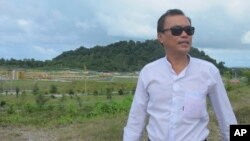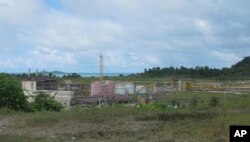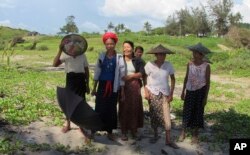China’s plan for its foothold on the Bay of Bengal, on Myanmar’s western coast in restive Rakhine state, includes an industrial zone, oil refinery and deep-water port that could transform a sleepy, remote town of 30,000 into a thriving business hub.
The plan for Kyaukpyu is central to Beijing’s ambitions in the region, but at sharp odds with local expectations. It also is stretching the capacity of the new, democratically elected government headed by Aung San Suu Kyi to protect the rights of residents who must move to make way for development in the “special economic zone.”
During Myanmar’s decades of military rule, Beijing’s expanding economic influence through investments in mining, dams, pipelines and other big projects fanned resentment against the huge and powerful neighbor to the north.
The Kyaukpyu projects are an extra irritant in a region riven by conflict between Buddhists and Muslims.
People wary of project
“Since the government has changed, people are expecting the SEZ to benefit their lives. If the situation becomes worse, they will protest,” said Khin Nyunt, a local shop owner.
He could benefit if an investment boom brings more activity. He has a breathtakingly beautiful stretch of beach in an area that may be developed as a resort zone. But he and others in Kyaukpyu worry they won’t be fairly compensated for their land, and they may have good reason.
Despite a moratorium on allocating land to special economic zones before a new land law can be enacted, a document seen by The Associated Press showed land surveyors have allocated more than a third of the land, 1,872 acres, for the special economic zone, potentially depriving landholders of their rights and compensation.
“Already, there have been land surveyors out here,” Khin Nyunt said.
He and his allies in the Kyaukpyu Farmers Association, a local civic group, say it happened before during construction of an 800-kilometer gas pipeline running from nearby offshore gas fields — and through some of their fields and gardens — to southwestern China.
Members of the group gathered in a rural community hall on a country road, smoking and fretting over potential looming changes. Most said they’d happily sell their land if prices are fair and the new factory zone brings jobs.
There’s plenty of room for improvement.
Restive area, high poverty
Rakhine has a poverty rate of nearly 80 percent according to the World Bank, with most people engaged in casual labor such as farm work, fishing and construction. Just over a quarter of families have access to electricity.
Almost a third of the population in the region is Muslim. Four years ago, an outbreak of violence in this isolated community 400 kilometers (about 250 miles) northwest of Myanmar’s commercial capital Yangon forced Kyaukpyu’s longtime Muslim population into displacement camps, where they languish, surviving on foreign aid.
Preliminary studies for the special economic zone conducted for the Myanmar government said it would create 50,000 jobs. New roads and a railway would help link the town to the rest of the region, and new investment would lead to improved schools and other public services.
“If there is transparency, local people are willing to have the opportunity for economic development,” said Khin Nyunt. “We didn’t see any improvement here from the gas pipeline. Local people only lost.
“People want garment factories, spare-parts factories, farm products exports, fruit processing. There are many industries that would not cause much harm,” he said.
Land use is an issue
Myanmar’s parliament approved the plan to develop a deep-sea port, industrial zone, logistics hub and other facilities in Kyaukpyu in December 2015, before the new government took office.
A consortium led by state-owned Chinese conglomerate CITIC Group holds an 85 percent stake in the $14 billion project. The Myanmar government owns the rest. If the industrial zone is built, it might also draw in investment from South Korea, Japan and other countries.
Conflicts over land present one of the most daunting challenges facing Suu Kyi’s government.
All land is state-owned in Myanmar, also known as Burma, though homeowners, farmers and companies can get titles for usage rights. Those rights can be taken without compensation if government surveyors deem land to be unused.
Farmers often end up losing land that might appear untended but is crucial for foraging, orchards or nomadic slash-and-burn farming.
“The process to acquire land is that a team goes out. They survey it. They say 'this is vacant and fallow land,’ because you’re not growing crops on it this week, or you don’t have your cattle on it today, so it’s vacant,” said Sean Bain, a researcher with the International Commission of Jurists.
He said some farmers in Kyaukpyu have lost gardens and farmland to two dams meant to supply the industrial zone.
Often, land is taken for projects that stall and then is awarded to companies and cronies.
“The old government made plans and tricked us,” said Tun Kyaw San, who pulls up on his phone’s screen a photo of a document he says shows he is still owed money for property taken for construction on nearby Maday island, site of a Chinese oil terminal.
“The cronies know what is going on but we don’t, and we haven’t consented to this,” he said.
Nations’ mutual need
China’s status as Myanmar’s closest and most powerful ally has been shaken in recent years as the military gradually yielded power to civilians, but it still retains enormous influence.
In Mandalay, Myanmar’s second-largest city, many locals chafe at growing numbers of Chinese visitors and residents, says Tun Lwin, a lawyer.
“It’s obvious they don’t belong here. Burmese in Mandalay worry about losing their social values or being influenced by Chinese culture,” he said. “Of course there are advantages and disadvantages from having Chinese here, since their investments can create job opportunities.”
Apart from its wealth of timber, oil and gas and mineral resources, Myanmar is China’s link to the Indian Ocean.
“Because of the nature of its investments, China needs Myanmar,” said David Steinberg, a professor emeritus at Georgetown University. “Myanmar also needs China.”
China views development of Kyaukpyu’s oil and gas facilities and the deep-sea port as vital for developing its landlocked, relatively backward southwestern Yunnan province, Steinberg said.
“Kyaukpyu is important to China. It could create jobs, but the Chinese often bring their own labor. That’s one of the complaints,” he said.
People hope for factories, jobs
China’s focus on energy and shipping clashes with residents’ desire for industries such as manufacturing that will bring local jobs. For the gas pipeline and for an oil pipeline that runs parallel to it, most construction workers were brought in and segregated in dormitories.
Kyaukpyu residents pin their hopes on jobs in a factory zone that may never be built, since China’s main incentive for developing the region is the desire for a rail head on the Bay of Bengal, said Sean Turnell, a Myanmar expert and adviser to its current government.
“The economics of it are all about China. The geostrategic aspects as well,” he said. “The expectations of local people are way out of whack with what’s coming their way.”








